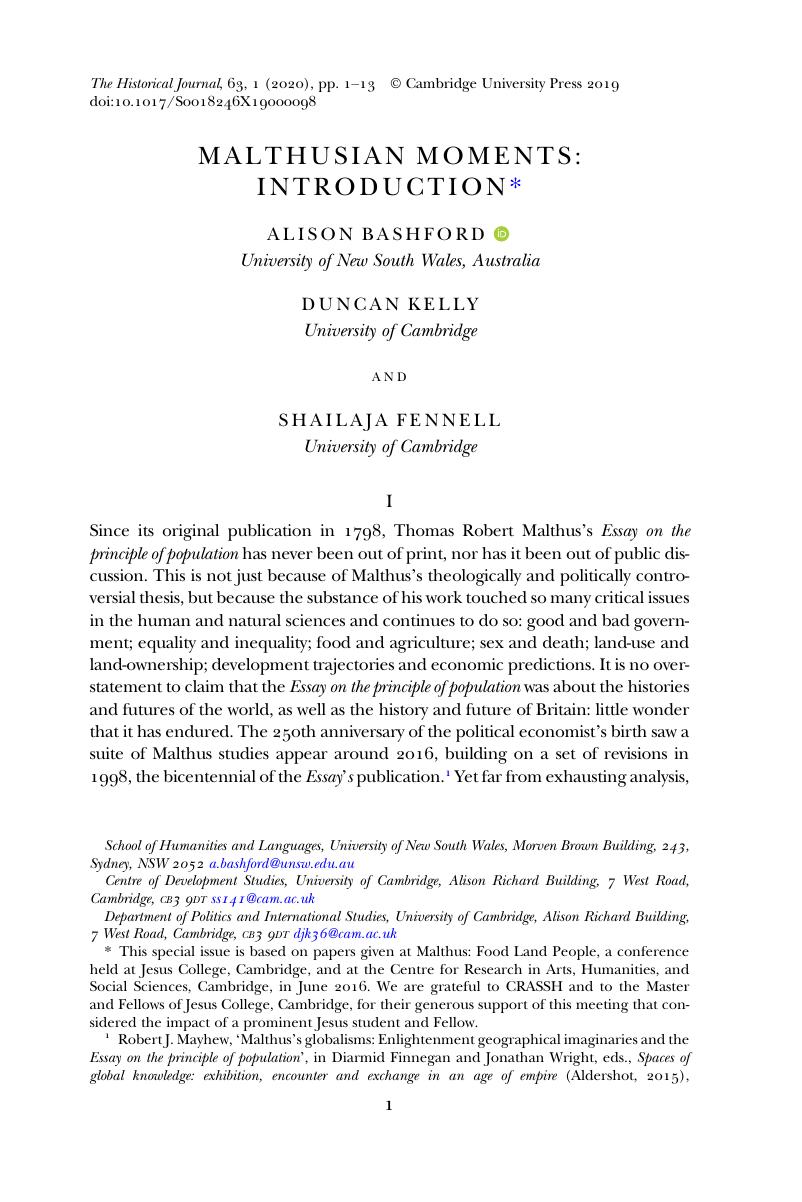Article contents
MALTHUSIAN MOMENTS: INTRODUCTION
Published online by Cambridge University Press: 24 April 2019
Abstract

- Type
- Introduction
- Information
- The Historical Journal , Volume 63 , Special Issue 1: Malthusian Moments , February 2020 , pp. 1 - 13
- Copyright
- Copyright © Cambridge University Press 2019
Footnotes
This special issue is based on papers given at Malthus: Food Land People, a conference held at Jesus College, Cambridge, and at the Centre for Research in Arts, Humanities, and Social Sciences, Cambridge, in June 2016. We are grateful to CRASSH and to the Master and Fellows of Jesus College, Cambridge, for their generous support of this meeting that considered the impact of a prominent Jesus student and Fellow.
References
1 Mayhew, Robert J., ‘Malthus's globalisms: Enlightenment geographical imaginaries and the Essay on the principle of population’, in Finnegan, Diarmid and Wright, Jonathan, eds., Spaces of global knowledge: exhibition, encounter and exchange in an age of empire (Aldershot, 2015), pp. 167–83Google Scholar; Mayhew, Robert J., ed., New perspectives on Malthus (Cambridge, 2016), pp. 105–27Google Scholar; Bashford, Alison and Chaplin, Joyce E., The new worlds of Thomas Robert Malthus: re-reading the principle of population (Princeton, NJ, 2016)CrossRefGoogle Scholar. See also Mayhew, Robert J., Malthus: the life and legacies of an untimely prophet (Cambridge, MA, 2014)CrossRefGoogle Scholar. For previous anniversary publications, see Pullen, John, ‘The last sixty-five years of Malthus scholarship’, History of Political Economy, 30 (1998), pp. 343–52CrossRefGoogle Scholar; Gilbert, Geoffrey, ed., Malthus: critical responses (4 vols., London, 1998)Google Scholar; Waterman, A. M. C., ‘Reappraisal of “Malthus the economist”, 1933–1997’, History of Political Economy, 30 (1998), pp. 293–334CrossRefGoogle Scholar; Coleman, David and Schofield, Roger, eds., The state of population theory: forward from Malthus (Oxford, 1986)Google Scholar.
2 Malthus, Thomas Robert. The works of Thomas Robert Malthus, ed. Wrigley, E. A. and Souden, David (8 vols., London, 1986)Google Scholar; Pullen, J. M., ‘Introduction’, in Malthus, T. R., Principles of political economy, ed. Pullen, J. M., Variorum Edition (2 vols., Cambridge, 1989), i, pp. 11–69Google Scholar.
3 For organic to fossil fuels, see Wrigley, E. A., Energy and the English industrial revolution (Cambridge, 2010)CrossRefGoogle Scholar; E. A. Wrigley, ‘Elegance and experience: Malthus at the bar of history’, in Coleman and Schofield, eds., The state of population theory, pp. 46–64.
4 Inverarity Manuscript, ch. 8, p. 30, question 10, Cambridge University Library, Marshall.c.35. Inverarity's, J. D. copy of Adam Smith, An inquiry into the nature and causes of the wealth of nations (Edinburgh, 1829)Google Scholar holds extensive interleaved notes from Malthus's lectures, comprising questions on the text set by Malthus and his prescribed answers. See also Pullen, J. M., ‘Notes from Malthus: the Inverarity manuscript’, History of Political Economy, 13 (1981), pp. 794–811CrossRefGoogle Scholar.
5 Wagner-Dobler, Roland and Berg, Jan, ‘Nineteenth-century mathematics in the mirror of its literature: a quantitative approach’, Historia Mathematica, 23 (1996), pp. 288–318CrossRefGoogle Scholar.
6 Pal, Eszter, ‘Scientific societies in Victorian England’, Review of Sociology, 20 (2014), pp. 85–111Google Scholar.
7 Drolet, Michael, ‘Tocqueville's interest in the social: or how statistics informed his “new science of politics”’, History of European Ideas, 31 (2005), pp. 451–71CrossRefGoogle Scholar.
8 Eknoyan, Garabed, ‘Adolphe Quetelet (1796–1874) – the average man and indices and obesity’, Nephrology, Dialysis, Transplantation, 23 (2008), pp. 47–51CrossRefGoogle Scholar.
9 Chai, Andrea and Moneta, Alessio, ‘Engel curves’, Journal of Economic Perspectives, 24 (2010), pp. 225–40CrossRefGoogle Scholar.
10 The original paper written by Engel is quoted on p. 216 of Perthel, D., ‘Engel's law revisited’, International Statistical Review, 4 (1975), pp. 211–12CrossRefGoogle Scholar.
11 MacDonald, J. Marc, ‘Malthus and the philanthropists, 1764–1865: the cultural circulation of political economy, botany and natural knowledge’, Social Sciences, 6 (2017), pp. 1–33CrossRefGoogle Scholar.
12 Goldman, Lawrence, ‘The origins of British “social science”: political economy, natural science and statistics’, Historical Journal, 26 (1983), pp. 587–616CrossRefGoogle ScholarPubMed.
13 For Malthus, the slave trade, slavery, and abolition, see Bashford and Chaplin, The new worlds of Thomas Robert Malthus, ch. 6.
14 Winch, Donald, Riches and poverty: an intellectual history of political economy in Britain, 1750–1834 (Cambridge, 1996)Google Scholar.
15 For Malthus and Christian politics, see Hilton, Boyd, The age of atonement: the influence of Evangelicalism on social and economic thought, 1785–1865 (Oxford, 1988)Google Scholar. For recent analysis of Malthus's theology and moral philosophy, see Cremaschi, Sergio, Utilitarianism and Malthus's virtue ethics: respectable, virtuous and happy (London, 2014)CrossRefGoogle Scholar.
16 Nelson, Eric, The Greek tradition in republican thought (Cambridge, 206)CrossRefGoogle Scholar; Nelson, Eric, The Hebrew republic (Cambridge, MA, 2011), esp. pp. 138ffGoogle Scholar; Jones, Gareth Stedman, An end to poverty? (London, 2004), esp. chs. 5–6Google Scholar; Claeys, Gregory, Citizens and saints: politics and anti-politics in early British socialism (Cambridge, 2010)Google Scholar; Claeys, Gregory, Machinery, money, and the millennium: from moral economy to socialism, 1815–1860 (Princeton, NJ, 1987)Google Scholar.
17 Bashford, Alison, Global population: history, geopolitics, and life on Earth (New York, NY, 2014), ch. 1Google Scholar; Bashford and Chaplin, The new worlds of Thomas Robert Malthus, pp. 3–4.
18 Robertson, Thomas, The Malthusian moment: global population growth and the birth of American environmentalism (New Brunswick, NJ, 2012)Google Scholar.
19 Ehrlich, Paul, The population bomb (Stanford, CA, 1968)Google Scholar; Hirsch, Fred, Social limits to growth (Cambridge, MA, 1976)CrossRefGoogle Scholar; Connelly, Matthew, Fatal misconception: the struggle to control world population (Cambridge, MA, 2010)Google Scholar; Bashford, Global population, chs. 10–12; Dorling, Danny, Population 10 billion (London, 2013)Google Scholar. See also Moyn, Samuel, ‘The political origins of global justice’, in O'Brien, M., Isaac, J., Kloppenberg, J., and Ratner-Rosenhagen, J., eds., Worlds of American intellectual history (Oxford, 2017), pp. 133–54Google Scholar.
- 1
- Cited by




